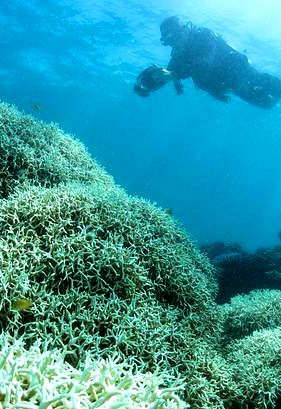Bleaching risk predicted
 Future marine heatwaves are predicted to heighten the risk of coral bleaching events.
Future marine heatwaves are predicted to heighten the risk of coral bleaching events.
A new study by the University of Adelaide suggests that the severity and duration of these events may be greater than previously recorded.
The research, which used climate modelling and supercomputing, indicates that marine heatwaves will cause coral bleaching to begin earlier in the year and persist longer.
The study projects that by 2080, coral bleaching will likely commence in spring rather than late summer.
This shift could jeopardise the reproductive success of corals, as many coral species spawn during spring.
“Our modelling projects a high risk that coral bleaching will coincide with this reproductive event, which will be devastating for thousands of coral species,” said Dr Camille Mellin, from the University of Adelaide’s Environment Institute.
Coral bleaching occurs when corals expel the symbiotic algae living in their tissues due to stress from elevated sea temperatures, leaving them white and weakened.
This phenomenon, while relatively recent, has already resulted in multiple global mass bleaching events since 1998, with the latest two occurring within the past decade.
The study details the expected severity, timing, and duration of coral bleaching events throughout the 21st century.
“Our projections of daily heat stress show that the greatest risk of severe coral bleaching this century will be along the equator, which is also home to the most biodiversity-rich coral reefs,” said Associate Professor Damien Fordham, also from the University of Adelaide’s Environment Institute.
Regions such as Indonesia’s Coral Triangle, which host diverse coral populations, are particularly at risk.
“Marine species in these regions are already living at temperatures near their upper tolerance levels and so are particularly ill-equipped to adapt to accelerated climate change, making them highly vulnerable to extinction,” Fordham explained.
Coral reefs at low latitudes provide essential food and income for millions globally, making their preservation crucial.
The study's findings, along with an online data portal, are intended to assist reef managers in identifying areas with lower bleaching risks and prioritising conservation efforts there.
“These next-generation projections will be crucial for developing conservation strategies aimed to protect and restore coral reefs in regions at lesser risk of future climate change,” says Professor Scott Heron from James Cook University.
The full study is accessible here.







 Print
Print